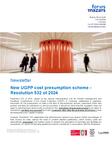New UGPP cost presumption scheme - Resolution 532 of 2024
Establishes a regulatory framework for the presumption of costs in the field of self-employed workers, particularly those who perform activities as contractors or service providers. It should be noted that this regulation does not apply to self-employed workers with a contract for the “provision of personal services”, but rather to contractors “on their own account” and with “contracts other than the provision of services”, such as transporters and “capital investors”.
However, Resolution 532 establishes that self-employed workers may deduct certain percentages of their income as costs, without the need to present detailed justification, which means, costs are automatically presumed. This system seeks to simplify the calculation of expenses and facilitate tax compliance, for which the following guidelines must be considered, in accordance with the Resolution:
1. Percentage of presumption: The rule establishes specific percentages of costs that can be deducted depending on the type of activity or contract performed. These percentages are applied directly to the self-employed worker's income and, in this way, the amount of costs that can be deducted is calculated.
Now, with respect to the percentages of costs indicated in Resolution 209 of 12 February 2020, in the current Resolution 532 of 2024 they were reduced for economic activities classified in the International Standard Industrial Classification Code (ISIC) as follows:
(Download our newsletter to review the percentages)
Of the changes in the percentages mentioned above, it should be noted that, for the first time, a presumption of costs of 28.08% will be applied to dividends and participations, which allows this proportion to be deducted as part of the costs when calculating the social security contribution base. This development provides greater clarity and benefit to capital investors, who previously had to justify the costs associated with this income with specific documentation.
Additionally, the percentage of presumption of costs for self-employed workers engaged in public motor freight transport remains unchanged with respect to that established in Resolution 1400 of 2019.
1. Possibility to modify the presumptive costs: Although Resolution 532 of 2024 establishes a standard percentage of presumed costs, self-employed workers have the option to adjust it, provided that they demonstrate that their actual costs are higher or lower in accordance with Article 3 thereof. For this purpose, self-employed workers must submit documentation supporting the costs or expenses actually incurred, in accordance with the provisions of Article 107 of the Tax Statute. This rule requires that the costs or expenses declared comply with the principles of causality, necessity and proportionality, thus ensuring their correct deductibility.
2. Supporting documentation: In case a worker decides not to apply the presumption of standard costs and wants to present actual costs, he/she must have the appropriate support documentation (such as invoices, contracts, etc.), which complies with the requirements established by law to be able to reduce those costs. It is important to note that the resolution does not oblige workers to change the presumptive system but gives them the option to demonstrate their actual costs.
3. Tax and social security obligations: The cost assumption system is also aimed at facilitating compliance with tax obligations and social security contributions. By establishing a simplified system, it reduces the administrative
burden for the self-employed workers and gives them greater legal certainty regarding their tax declarations and contributions to the pension and health system.
In conclusion, the cost presumption system in Resolution 532 of 2024 seeks to provide a simplified tool for self-employed workers, allowing them to deduct certain percentages of their income as costs without the need to justify them with detailed documentation, although with the option to modify that presumption if they have the appropriate evidence.
Finally, it is important to highlight that Resolution 1125 of 2024 modified the validity of Resolution 532 of 2024, establishing that its entry into force will be on 1 June 2025.

